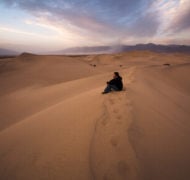Finding Each Other in the Dust
Daily Reflection / Produced by The High Calling
For He knows our frame; He remembers that we are dust.
Psalms 103:14
The students have questions, and I’m flattered. They’ve read the first book I wrote, and in the absence of their professor—who’s away on a mission trip—they’re with me on Skype, jumping to ask questions.
So I square my back, ready to answer, hoping to sound academic, theological, and maybe even intellectual. Then comes the first question: Why did you write your book?
And I stop. Tell that story? The true story?
To connect with folks, however, I must do exactly that—tell my truth so they can know me, but so they’ll tell their truth so I can know them in turn.
That’s the God model. For he knows our frame, says Psalm 103. “He remembers that we are dust.” Still, he loves us: mess and all. His empathic connection is bonded by his compassion.
We want empathy the other way. Clean, proper, nice, easy. But true empathy, that mystical emotional ingredient enabling us to relate to one another, requires the sharing of our failures and grit.
In that miry clay, we finally see each other’s truth. Then we empathize, realizing others' grit and failures look a bit like our own.
So with these students, I stir my dust. Then I take a deep breath.
“I got fired,” I told the students. The Skype call got quiet—the students deeply listening to my dust. Listening to my truth.
I did get fired. Well, not totally. Office politics were at play, and when that dust settled, I was short of a job. Not really fired, but jobless. And needing to reinvent my life.
The students nodded. They understood. Life happens. Empathy established.
“So I ended up teaching at a state university,” I explained, “and the tenure rule there was ‘publish or perish.’”
The good work of teaching changed me. Even more? “I wrote my first book.”
Not a pretty path to publication, I confessed to the students. “But it’s my truth.” So I told it—and the students appreciated the honesty, allowing us to relate and connect. Then we could truly Skype, having a discussion anointed by transparency, laughter, and tenderness. The result?
Empathy. Authenticity. Connection. Love.
When we tell our dusty details, we remember and connect best. The psalmist David understood that as much perhaps as anyone.
“Praise the Lord, my soul … ,” he wrote, “who redeems your life from the pit and crowns you with love and compassion” (Ps. 103:2, 4). He, our God, remembers that we are dust.
Thus is our empathy for one another. I see your dust. You see mine. Then we can share God’s love.
Putting on a front and covering up our real selves may leave people feeling safe. For real empathy, however, something honest and dangerous must transpire.
The work of writing, as it turns out, requires dangerous honesty, too.
Jesus wrote of such things in the sand. Then he gave his life for us. May we offer this same empathic power to each other. Then we can crawl through dust to share God’s love.
QUESTIONS FOR FURTHER REFLECTION: Are you honest? Do you tell the truth about your life? What conditions do you require to share honestly? On the spectrum of empathy, where do you fall? Explain. If God is the model for empathy, how can you deepen your empathy for others?
PRAYER: Give us courage to tell our dangerous truth, O Lord, blazing an honest path to shared empathy. Amen.






